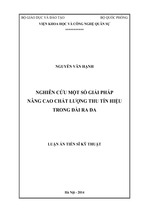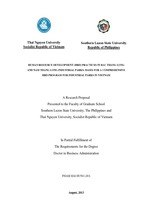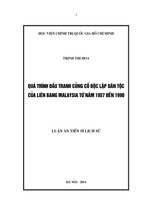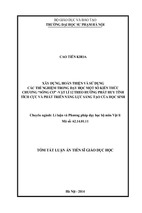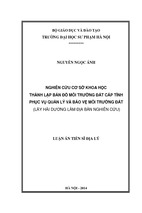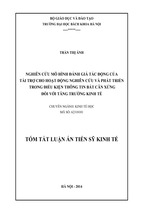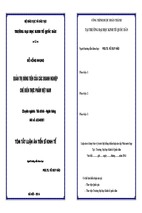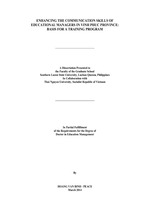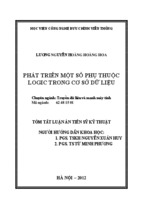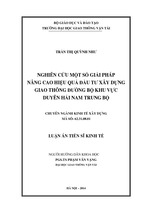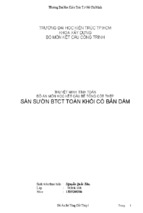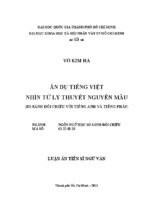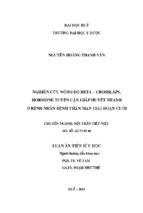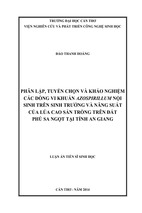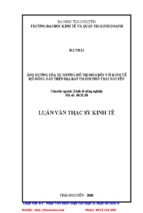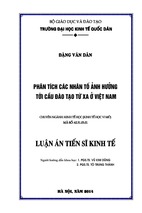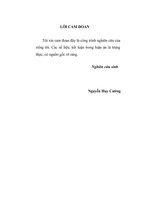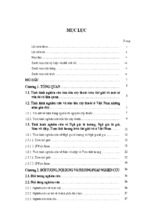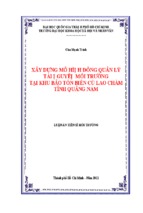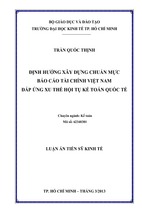MINISTRY OF EDUCATION AND TRAINING
THUONGMAI UNIVERSITY
-------------------------
VU THI THU HUYEN
OPERATIONAL AUDIT OF EXPENDITURES FROM
THE STATE BUDGET IN MINISTRIES
Major :
Accounting
Code :
62.34.03.01
SUMMARY OF DOCTORAL THESIS IN ECONOMIC
Hanoi, 2018
The thesis is completed at
THUONGMAI UNIVERSITY
Scientific instructors
Judge 1:
Judge 2:
Judge 3:
The thesis is to be presented at the Thesis Council at the university level
at………………………
At…..hour……day….. mouth…….year………
The thesis is available at:
- The National Library of VietNam
- The library of the ThuongMai University
LISTED OF PUBLISHED WORKS OF THE AUTHOR
1.Vu Thi Thu Huyen (2016), “Auditing activities with the fight against corruption in the
public sector”, Journal of Accounting and Auditing, 4/2016
2. Vu Thi Thu Huyen (2016-2017), "Research Auditing activities in the public sector ", the
topic of scientific research at the university level.
3. Vu Thi Thu Huyen (2017), “Establishing audit criteria for audits at administrative
agencies conducted by the State audit agency”, Journal of industry and trade , 3/2017
4.Vu Thi Thu Huyen (2017), “Completing the process of auditing activities performend by
the State audit of Viet Nam” Journal of industry and trade , 5/2017
5. Vu Thi Thu Huyen (2017), “Auditing activities: current situation and problems”, Journal
of Financial,6/2017
1
INTRODUCTION
1. Rationale
In fact, operational audit has been considered as an independent form of audit in the
operations of the State Audit. On the other hand, due to lack of transparency, accountability, lack of
reliable information from the State and agencies managing this issue, operational audit has become
one of the most effective tools to meet the requirements of providing objective, comprehensive and
beneficial information to the public, to authorities, and to the people in exercising their supervisory
powers regarding the economic efficiency and effectiveness in the implementation of policies and
resolutions of the National Assembly and the government on an effective administration.
In addition, the theory of operational audit, involving operational auditing of expenditures from
state budget, is of interest to economic experts, but there has been not much research done and there
have been many arguments needed to study in detail. In particular, the total budget expenditures
keep increasing each year, and the budget size of the next year is higher than the previous year. For
regular expenditures from State Budget, the rate of increase in public expenditures in the period
2011-2016 was 17% per year on average. The highest proportion was for education and training,
accounting for 38%, 23% for administrative management, and 12% for health care. In the period
2011-2016, the proportion of expenditure for development programes in the total state budget
expenditure was estimated at 18%. As a result, the budget spending in Vietnam is constantly high,
causing a budget deficit that threatens the sustainability of the state budget.
Therefore, the study on the subject "Operational audit of expenditures from the state
budget in ministries" is a requirement of auditing theory and practice and is in line with the
orientation of improving activities of operational audit in the development strategy of the State
Audit up to 2020.
2. Overview of the research
Through the overview of the study, it can be seen that the implementation of research on
operational audit in such a specific field as expenditures from the state budget is still challenging issue
and a big gap need to be filled in some aspects like performance standards, auditing content, procedures,
forms, audit profiles and auditing methods... . In addition, there have been many studies on operational
audit, but there is no research work on activities of operational audit separately for expenditures from s
tate budget carried out by the State Audit. The PhD thesis identifies the following issues that need to be
investigated:
(1) To do more research to clarify the theoretical background of operational audit such as the criteria,
content, process and methods of operational audit.
(2) To study the status of operational audit of expenditures funded by the state budget, carried out by
the State Audit
(3) To propose measures to complete the operational audit of expenditures from the state budget
implemented by the State Audit in the context of international integration.
2
Thus, the study on the subject "Operational audit of expenditures from the state budget in
ministries" is an urgent and meaningful issue both in theory and in practice in our country at present as
well as in the long run.
3. Research objectives of the thesis
- Systematize and analyze to clarify the basic theories of expenditures from the state budget;
Operational audit theories conducted by the State Audit.
- Conduct surveys, analyze and evaluate the actual situation of expenditures in some
ministries using the state budget as evidence for the operational audit of expenditures from the state
budget in order to indicate the results achieved, limitaions and causes of limitations.
- To propose measures to complete the operational audit of expenditures from state budget
sources in the ministries, which are performed by the State Audit and the conditions for
implementation of solutions.
4. Subjects and scope of study
- Subjects of the study: The thesis focuses on studying and finalizing the operational audit of
expenditures from the state budget performed by the State Audit.
- Scope of the thesis study: The thesis studies the operational audit of expenditures on capital
construction investment (which accounts for a large proportion of development investment
expenditure) and the regular use of state budget capital in ministries audited by the State Audit, the
actual data that have been studied in recent years from, 2013 to 2017.
5. Research questions
- What is the rationale for operational audit of expenditure from the state budget? How do the
State Audits of developed countries in the world work?
- What is the actual situation of operational audit of expenditures from the state budget? What
are the advantages and disadvantages of application? What are the causes of these limitations?
- What solutions should fit both the theoretical framework developed and promulgated by the
State Audit, and can be applied in audit practice? and what are conditions to implement the
solutions?
6. Research methods
- Method of data collection: The researcher collects documents through the following methods:
sending survey questionnaires, live interviews, observation, investigation of audit documents;
Collecting and studying the research results of domestic and foreign experts related to the thesis.
- Methods of processing and synthesizing information and documents
+ Based on the information collected, the PhD student checks the reliability, appropriateness of
the data collected, synthesizes the results of research on the theory and synthesis of the results of the
survey.
- Analytical methods
+ Based on the analytical results, the researcher analyzes the comparison between theory and
3
practice to conclude and to perceive weaknesses and shortcomings of the operational audit of
expenditures from budgetary sources in the ministries, which are performed by the State Audit as
the basis for making comprehensive solutions.
7. The results of the thesis
- Theoretically: To systematize, clarify and supplement the general theory on expenditures
from the state budget, and operational audit conducted by the State Audit.
- In practice: The thesis describes, analyzes and evaluates the actual situation of operational
audits of expenditures from the state budget in the ministries carried out by the State Audit in the
past years, pointing out the results achieved during the implementation of the operational audit,
especially the limitations and causes for such limitations. Based on that the thesis proposes
solutions to perfect the criteria, contents, procedures and methods of operational audit of
expenditures from the state budget in the ministries carried out by the State Audit of Vietnam.
8. The organization of the thesis
Apart from the introduction, conclusion, apprendices, the thesis consists of 3 chapters:
Chapter 1: The general theoretical background on expenditures from the state budget and the
operational audit conducted by the State Audit
Chapter 2: The current situation of operational audit of expenditures from state budget in
ministries
Chapter 3: Solutions to improve the operational audit for expenditures from the state budget
in ministries
4
CHAPTER 1
LITERATURE REVIEW ON EXPENDITURES FROM THE STATE BUDGET AND
OPERATIONAL AUDIT PERFORMED BY STATE AUDIT
1.1. Overview of expenditures from the state budget and operational audit performed by the
State Audit
1.1.1. Overview of expenditures from the state budget
1.1.1.1. Definition of expenditures from the state budget
In this section, the thesis examines the views on expenditure from the state budget, thus
pointing out the concept of expenditures from the State budget.
From the views on expenditures from the state budget, it can be stated that "State budget
expenditures are all expenditures of central and local governments and administrative units to
cover the operational spending managed and controlled by the government."
1.1.1.2. Classification of expenditures from the state budget
a, Based on the state function, expenditures are divided into: expenses for construction of
material facilities, expenditures of administrative management apparatus, expenditures for defense
and social security, expenditures for people's courts and institutes, for the education and training
system, social welfares, business supports, and other expenses.
b, According to its functions, state budget expenditures can be divided into regular expenditures
and development investment expenditures.
1.1.1.3 Characteristics of budget expenditure affecting the operational audit of state budget
expenditures conducted by the State Audit
Financial resources covering regular expenditures are distributed according to the annual
budget plan relatively evenly between quarters of the year, between months in the quarter, between
years in the planning period.
All budget expenditures must be estimated and fully aggregated into the state budget.
Expenditures can be made only when there are cost estimates assigned by competent authorities and
must comply with the expenditure regimes, criteria and norms set by competent state agencies.
1.1.1.4. Contents of expenditures from the state budget
Expenditures from the state budget mainly include regular expenditures and development
investment expenditures. In particular, regular expenditures include: Payments for civil servants and
government’s employees: salaries, wages, subsidies, payroll contributions, bonuses, collective
benefits and payments… Expenditures for development investments include: expenditure on
investment in public infrastructure construction, support to SOEs, investment in equity contribution
to enterprises operating in the field necessary for the state to govern and spend the state reserves.
1.1.2. Overview of operational audit
1.1.2.1 . The development history of operational audit in the public sector
In the world, operational audits have become popular in recent decades. Although it has
5
grown since 30 to 40 years ago (Chapman, 2007), the development of operational audits varies from
country to country. Prior to the 1960s, few countries practiced operational auditing. Operational
auditing first appeared in the United States and Sweden (Adams, 1986). Operational auditing is a
professionally demanding and large-scale occupation that first appeared in the 1970s (Pollitt et al.,
1999). However, by the 1990s, operational audits were fully set up and had its own staff in
Australia, Canada, Finland, France, the Netherlands, New Zealand, Norway, Sweden, England and
the United States. Thus, operational audits are now the primary type of audit in supreme audit
institutions.
1.1.2.2. Concepts and objectives of operational audits
a. The concept of operational audit
There are many definitions related to operational audits with different perspectives, but the
content of these definitions focuses on three aspects: economy, efficiency and effectiveness.
Consequently, these are considered as important criteria to evaluate the results of the audited
activities. Therefore, this type of audit is simply referred to as the 3Es audit.
On the basis of analysis of expenditures from the state budget and the operational audit, the
nature of operational audit of expenditures from the state budget can be defined as follows:
"Operational audit of expenditures from state budget is an audit activity in which the auditor aims
to examine and evaluate the economy, effectiveness and effectiveness of the management and the
use of budget capital; performing expenditure tasks based on appropriate criteria. "
b. Objectives of operational audit
Audit objectives form the basis for auditing. Audit objectives related to the cause of the
audit are the things to be achieved through the audit. Auditing objectives specify the content to be
audited and how the content is evaluated. Once the audit objectives have been identified, the scope,
audit criteria and approach will be developed; Audit objectives should be established early in the
audit planning phase. Auditing objectives often give an opinions on the economy, effectiveness,
effectiveness of the audited units, operations, issues.
1.2. Criteria for operational audit
1.2.1. The definition of operational audit criteria
Criteria can be understood as a norm, a rule or an experiment to evaluate an object or issue.
According to the researcher, the concept of the criteria for operational audit of the
expenditures from the state budget is as follows: “Criteria for operational auditing are qualitative
and quantitative rules and norms that can be attained. Based on that, it is possible to assess the
economy, efficiency and effectiveness of expenditures from state budget sources of the unit.”
Economy, efficiency and effectiveness can be summarized as follows:
Economy: The audited entity purchases/implements resources at the lowest cost while
ensuring the fulfillment of the objectives of the activity.
Efficiency: The use of resources by the audited entity to ensure that the objectives of the
6
activity are met.
Effectiveness: the audited entity's achievement of goals and outcomes in a particular activity
1.2.2. The sources for the development of the criteria for operational audit of expenditures
from the state budget
Audit criteria can generally be constructed from a variety of sources. However, the auditor's
judgment plays a very important role in determining the source of the material that establishes
credibility and reliability.
Auditors seek guidance from the above criteria and establish the actual auditing criteria suitable
for auditing subjects and auditing purposes. In the process of establishing the criteria, practical
conditions should be taken into account and appropriate adjustments should be made in consultation
with experts in the field of auditing.
1.2.3. Criteria for operational auditing of expenditures funded by the State budget
1.2.3.1 Group of auditing criteria on economy
The economy is also called "saving". Therefore, economy is also understood as saving and
minimizing the resources used for a given activity. Economy is an aspect of efficiency but it is meant
to be separate when considering the assessment of activities, especially in the activities of public
service agencies.
1.2.3.2 Auditing criteria of efficiency
Efficiency is the leading principle of financial management in both the public and private
sectors. The principle of efficiency means that the output is maximized on the basis of the resources
used. Efficiency concerns the relationship between resource use and output in terms of quantity,
quality, and time. Criteria for evaluating the effectiveness of state budget expenditures are therefore
quite diversified and also different from private sector performance assessments.
1.2.3.3 Auditing criteria of effectiveness
Effectiveness is the result of carying out the objectives and tasks of a unit. It is therefore also
known as the result audit. Validation audits are often conducted in public sector organizations,
which are also called performance audits, to improve management capacity and operational
efficiency. Auditing the effectiveness of operational audits involves achieving the stated objectives
of the audited entity and auditing the actual impacts of the activity and comparing it with the
expected impact.
1.3. The contents of the operational audit performed by the State audit
Auditing budget expenditures of ministries and branches, including: grade-I estimating units
and grade-II estimating units; Units directly managing and using state budget (Level-III estimation
units, construction investment project management units ...)
To assess the economic efficiency and effectiveness of the management and operation of
funds: from the stage of estimation, implementation of budget estimates and final settlement of the
State budget;
7
To assess the effectiveness and management efficiency assigned by the State according to
spending tasks which must be implemented by ministries and branches.
To sum up the audit results according to the set criteria of the audited units.
1.4. Methods regarding operational audit of state audit
1.4.1. Audit methods regarding results
Does this method help auditors to evaluate expected outputs and outputs, or whether
activities / programs are operating as planned?
1.4.2. Auditing methods by System
This method helps auditors assess whether the management system of the organization is
operating properly or not in order to manage the risk.
1.4.3. Auditing method by issue
This method helps auditors to check, evaluate and analyze the reasons for specific problems
or deviations from the criteria.
For state budget spending, the results-based and systematic approach is the most appropriate
approach for assessing the three criteria: economy, efficiency and effectiveness both quantitatively
and qualitatively.
1.5. Process of operational audit performed by state audit
1.5.1. Preparation stage of operational audit
During the preparation stage of the audit, the auditor usually collects information on budget
statements at all levels in the audited ministries, sectors, monetary issues, factors affecting the state
budget expenditure. Based on that, auditor will develop auditing criteria from multiple sources.
1.5.2. Stage of auditing
The stage of the auditing is the stage of development and implementation of the auditing
methods and procedures set out in the audit plan to collect and analyze sufficient, appropriate and
reliable evidence, On that basis, the audit findings, conclusions and recommendations of the audit
team will be made.
1.5.3. Writting and issuing auditing reports
The report on the operational audit of expenditures from state budget will be completed in
order to evaluate, make conclusions and recommendations on the contents of the operational audit
of expenditures from State budget sources.
1.5.4 Monitor, inspect and implement auditing proposals
Monitoring, inspection and implementation of audit proposals are the final stage in the audit
process, in which the auditor will focus on whether audit proposals have been done by audited units.
Checking the implementation of the conclusion, the proposal consists of three steps:
scheduling inspection, conducting inspection, writting inspection reports.
1.6. The experiences of the State Audit of other countries on operational audit and lessons for
the State Audit of Vietnam
8
1.6.1 Experience of international auditing organization on the development of auditing
standards in the public sector
Firstly, the group of synthesis criteria
Based on the objectives of assessing the economy, efficiency and effectiveness of
performance of the unit to determine the criteria. With synthesis criteria, the most common attribute
associated with the general purpose of the units should be applied in the general assessment when
determining audit results.
Secondly, building a set of specific criteria
Indicators used to clarify aggregate criteria as well as used for analysis and evaluation, the effects
of internal and external environment result in the identified results using aggregate criteria in order to
give specific and practical recommendations.
1.6.1.1. Experience in developing criteria for economy assessment
The economy shows the level of saving of inputs while still achieving the unit's operating
objectives. Used to evaluate whether resources are purchased reasonably in terms of cost, quantity
and quality, place, time or not.
1.6.1.2. Experience in developing criteria for efficiency evaluation
Efficiency shows the relationship between the cost of the inputs and the output of the activity.
Efficiency reflects the quality of the management process.
1.6.1.3. Experience in developing criteria for effectiveness
The effectiveness indicates the level of achievement in the unit's performance. Evaluate the
accomplishment of a unit / activity goal. Evaluate whether the unit achieves a predetermined target
or produces expected effects.
1.6.2 The experiences of the State Audit in other countries in developing the operational audit
process
The State Audit basically stipulates that the process of auditing in general and the procedure
of operational audit in particular are divided into 3 phases: preparation of auditing, auditing and
audit report. For the fourth phase, monitoring, examination and implementation of audit proposals,
although not usually stipulated in the law, the guiding documents refer to this stage in two forms: as
a follow-up period after the reporting period or as a necessary part of the subsequent auditing
period.
1.6.2.1 Experience of operational auditing of the UK National Audit
The process of operational auditing of the State Audit in the United Kingdom consists of three
stages: preparation audit; performing audits and auditing reports.
1.6.2.2. Experience in the operational audit in the Federal Republic of Germany
In the Federal Republic of Germany, the principle of economic activity in the state is
enshrined in the Constitution. Since 1969, when Germany amended the Constitution, the authority
of the Federal State Audit was audited for its economy, efficiency and effectiveness in management.
9
Activity
Selection
Audit
planning
Implementation
Prepare
and
submit
reports
Check the
implementat
ion of the
proposals
1.6.3. Lessons drawn from the operational audit experience of the Supreme Audit Institutions
in the world
1.6.3.1. Lessons learned in constructing, defining audit criteria
First, enhance the expertise and external consultants in the proffesional area of operational
auditing to advise on criteria development due to the diversity of auditor performance.
Second, it is necessary to build from general to detailed; It must be based on the guidance of
the operational audit standard and the specific regulations on operational audit.
Third, the practical experience of each country shows that each audit activity has different
criteria, so auditors always have to coordinate experts and audited units to see if the constructed
criteria are relevant and suitable to the content of the audit?
1.6.3.2. Lessons learned in developing audit contents
Specific features of spending from the state budget are to ensure cost effectiveness in terms
of both economic and social aspects, so the operational audit is often associated with auditing
compliance with the budget process, State budget law, public investment law. Therefore, in the
audit content, choosing which criteria is important also depends on the functions and tasks of the
ministry.
The State Audit must organize the formulation and promulgation of a manual on operation
auditing, which must clearly define objectives, contents and methods, particularly criteria for
assessing the economy, efficiency and effectiveness for specific audit areas.
1.6.3.3. Lessons learned in developing auditing methods
Direct approach to results: The auditor directly meets and communicates with the managers
and staff of the unit in the audited entity.
Documentation method: The auditor conducts internal audits of the entity being audited, as
well as external documents related to the entity's economic operations. .
Field survey method: The auditor directly observes the process of operation, the operation of
the staff during the work to analyze and evaluate the collected information.
1.6.3.4. Lessons for developing auditing process
Firstly, it is necessary to clearly define the legal status of the State Audit and the State Audit
Secretariat not only in the Constitution, but also to ensure compatibility between the Constitution
and the Law on State Audit and related laws.
Secondly, in order to ensure a quality and effective operational audit, organizational work
must be carried out carefully and synchronously from the planning stage to the completion of the
10
survey to identify auditor objects, auditor subjects and subject matter and the collection of evidence
and analysis of evidence and development of audit reports.
Thirdly, improving the organization and management of operational auditing of the
delegation, the audit team, especially auditors
Conclusion of chapter 1
In chapter 1, the thesis analyzed, systematized, clarified and supplemented the general
theories on expenditures from the state budget and operational audit. Particularly, the thesis
clarified the analysis of audit contents, economic criteria, effectiveness and validity in operational
audit; The method and process of operational auditing of expenditures from the State budget. In
addition, in this chapter, the thesis also examined the experience of operational audit in the public
sector of Supreme Audit Institutions in some countries in the world, thereby drawing lessons for
Vietnam.
11
CHAPTER 2
THE CURRENT SITUATION OF OPERATIONAL AUDITING OF EXPENDITURES
FROM THE STATE BUDGET IN MINISTRIES
2.1 Overview of the operational ausit of the State Audit of Vietnam
2.1.1 Development history, characteristics of the operational audit of the State Audit of
Vietnam
The development of the State Audit is an objective factor in order to meet the requirements of the
real situation, and to increase the state control role in the management and use of state budget
expenditures for reasonable economic efficiency, prevention of negative behaviors, waste of state
finances at government agencies
At present, specialized state audit agencies II and III have the task of auditing the management
and use of state resources in ministries and branches; The auditing units of Regions I and IV audit the
budget-accounting reports with economy, efficiency and effectiveness in spending activities funded with
state budget capital; namely, regular expenditures and development investment expenditures in the
ministries
Each unit has functional rooms to perform tasks. The State Audit Office has its own seal; The
regional state audit and non-business units have the legal person status, their own seals, accounts and
offices
2.1.2 Overview on the development of operational audit conducted by the State Audit of Vietnam
From 2007 to 2013: The State Audit's development strategy up to 2020 has set the objective
of "accelerating the operational audit to examine and evaluate the economy, efficiency and
effectiveness in asset and state budget management.”. The period 2013-2017 states: "Strengthening
the value and benefits of assessing the economy, efficiency and effectiveness of public asset
management."
2014: Actual audit has shown the urgent need to improve the operational audit as an
independent audit form in the operation of the State Audit to ensure the professionalism and
effectiveness of this type of audit. By 2015, the State Audit carried out 7 operational audits; 201 and
2017 carry out 19 operational audits each year to assess the economy, efficiency and effectiveness
of audited programs, projects and activities. The results of the audit indicated the shortcomings in
the management, administration and implementation of the activities of the State management
agencies on the audit criteria set out.
2.1.3. Results of operational audit for state budget expenditures in ministries
According to the report of auditing results of 2016 performed by the State Audit, the results of
the inspection of the implementation of the audit proposal 2015 on the fiscal year 2014 of the State
Audit in 2016 shows that most audited units have directed and strictly implemented the conclusions
and recommendations of State Audit, in which:
- Proposed financial handling until December 31st, 2016 was 15,794 billion dong, accounting
12
for 75.6% of the total proposal (63.1% in 2013, 64.3% in 2014), in which regarding the increase in
revenues, reduce state budget expenditure 3,996 billion, accounting for 82.3% (66.2% in 2013, 75%
in 2014).
2.2. Actual situation of operational audit of expenditures from state budget sources in
ministries
2.2.1 Actual situation of operational audit of state budget expenditures in ministries
The audit criteria will be formulated in the audit plan based on audit objectives when
assessing the need to conduct an audit of that activity at the entity. Auditing criteria are the biggest
difference to distinguish between an audit of operations and financial statements and compliance
auditing (this auditing is not required to establish auditing criteria)
2.2.1.1 Criteria for assessment of economy (savings)
The economy in operational auditing of expenditures from the state budget in ministries, is
often compared with the total expenditure by the National Assembly and the level of expenditures
according to the final accounts of the Ministry and the levels of estimated expenditures and
spending determined by the Ministry for recurrent expenditure and development investment.
a, Evaluation in each recurrent expenditure
Basically, when determining the criteria for assessing the cost savings of each specific activity
in recurrent expenditure, the auditor bases on the spending norms of the state budget of the
ministries determined in terms of total resources State budget for the Ministry's budget. The
allocation norms for state budget spending of ministries can be implemented in accordance with the
Decision No. 46/2016 / QD-TTg on the standard for allocation of estimated state budget
expenditure for 2017.
2.2.1.2. Criteria for evaluation of efficiency
Efficiency shows the relationship between the cost of the inputs and the output of the
expenditures from the state budget provided by the unit. Evaluate efficiency criteria through
analysis and evaluation of expenditure structure for spending activities in ministries.
Criteria for assessing the efficiency of state budget spending in the ministries is
referred to he criteria of efficiency in the use and management of expenditures and efficiency
in the Ministry's budget spending process. Evaluation can be based on attainment, achieved
partially or not achieved.
For investment activities: At present, the State Audit of Vietnam considers the
investment efficiency to reflect whether the investment item has been implemented and
completed on schedule. When the investment on schedule will meet the criteria of capital
efficiency. In addition, if the above savings criteria are met such as savings versus cost
estimates, savings versus winning bids ... then also meet the criteria of cost effectiveness.
13
2.2.1.3. Criteria for assessment of effectiveness
The effectiveness of budget spending at the Ministry is indicative of the level of achievement
of the department's expenditure targets. This criterion is very difficult to determine, and can be
divided into two groups of criteria:
- Defining criteria: are often reflected in the objectives of the activity plan or calculated from
the activity plan of the unit.
- Evaluating criteria: predicting the impact of future performance on expenditure if
implemented in accordance with capital plan,
2.2.2. The content of operational auditing for expenditures from budgetary sources in the
ministries
To evaluate the effectiveness of the implementation of the budget expenditure program, the
observance of law, the regime of management of the budget and public finance.
Assessing the economy, efficiency and effectiveness in the use of state budget expenditures: the
use of financial inputs, the level of service quality created in association with the accountability of
the management people.
Assessing the responsibility of individuals, groups and handling proposals; To detect
shortcomings and propose amendments and / or supplements to mechanisms and policies in the
process of spending from State budget capital sources and auditing expenditures from the state
budget in ministries.
2.2.2.1. Auditing regular operating spending activities
General auditing of recurrent expenditures from the state budget
Detailed audit in the units of estimation, non-business units under the Ministry
2.2.2.2. Auditing expenditure on development investment:
General auditing of development investment expenditures from the state budget
Detailed audit at project management unit (PMU)
2.2.3 Situation of auditing methods for expenditure activities from state budget sources in the
ministries
2.2.3.1. Basic audit methods
Analysis of budget expenditure data, comparison and checking of state budget expenditure
estimates with real state budget expenditures; Check the budget documents such as the report on the
final settlement of the budget of the Ministry, the statistics of the budget of the Ministry, the
summary of data ...; document inspection; field inspection and sample selection.
2.2.3.2. Verify the internal source of documents
The internal source is the source provided by the PMU, or the owner, in relation to the
investment policy, investment preparation stage, investment implementation stage and Completed
investment and construction activities approved by the competent person in charge of investment.
14
2.2.3.3. Verify the external source
The legal documentation of the operation is largely provided by the outside, such as:
geological survey file, technical design file, technical design appraisal report and total cost estimate
report. ..
2.2.3.4. Field inspection method
The field inspection method is to compare whether the actual workload is consistent with the
construction design drawings or not?
2.2.4. Actual situation of the process of operational auditing for state budget expenditures in
ministries
The audit process still follows the order of state budget audit reports in the Ministry. The state
budget audit process consists of 5 chapters and 17 articles stipulating the order, content and
procedures to be carried out according to the four steps of the state budget audit, namely: Audit
preparation; Conduct audits; Making and sending audit reports; To monitor and inspect the
implementation of audit conclusions and proposals.
2.2.4.1. Actual situation of preparation stage for auditing
On the basis of the annual audit plan, basing itself on the auditing tasks and decisions of the
General State Audit to set up audit teams, the specialized State audit agencies will elaborate the
audit plan for each audit and the audit team is composed of the head and deputy head of the
auditing team members and the auditing units of the Ministry.
2.2.4.2. Actual situation of auditing stage
Performing the audit is the focus of an audit. The unit in charge of implementation (the
General Affairs Department, the specialized State Audit Office) will organize the audit team
meeting, assign tasks to its attached sections. Based on the audit plan approved by the leader, the
audit team will hold a meeting with the representative of the audited entity to inform the plan and
implement the audit. Auditing teams will base themselves on the auditing objectives, contents and
criteria already elaborated in the audit plan and on the basis of the documents and reality
examination at the units, the auditing staff conduct the audit according to the plan.
2.2.4.3. Real situation of stage of making and issuing audit reports
a, Prepare the draft report of the operational audit
The head of the audit team will set up the drafting team to prepare the audit reports. The
drafting team is responsible for receiving and revising audit records and auditing evidences
collected and analyzed by the audit team or audit records; Synthesize the data collected at the
auditing unit, make summary tables of audit results according to the contents or objectives in the
plan.
b, Drafting the content and structure of the draft report
Operational Audit reports often have more extensive audit findings than audited financial
statements or budget auditing reports. More discussion is needed to resolve all the arguments and views
15
involved. Therefore, although the issuance report is the final official report, the auditor must prepare
several types of reports, such as preliminary reports, reports for discussions, brief reports and
presentations for all levels of the State Audit.
c, Approving, issuing and publicizing the results of the audit report
When the audit report after the convention is passed, the audit team will prepare a report for
issuance and submit it to the audit leader for signing the issuance letter and send it to the audited
administrative agency; It highlights some of the recommendations in the report.
2.2.4.4. Actual stage of monitoring, inspection and implementation of audit proposals
Based on the annual or unusual inspection plan of the State Audit, according to the State
management requirements of the National Assembly; The State Audit set up audit teams to make
proposals after the audit units report on the results of implementation of the proposals. At this stage,
the inspection team may make recommendations to the survey delegation, depending on the tasks
assigned by the State Audit
2.3. To evaluate the actual state of operational audit of expenditures from state budget
sources in the ministries performed by the State Audit
2.3.1. Achievements
2.3.1.1. Advantages in building audit content
The auditing content has basically covered the process of managing and administering the
expenditures of the Ministry in estimating, implementing budgeting and finalizing expenditures.
The contents of the audit have evaluated the rationality in the expenditure estimation
criteria, the assessment of the economy, efficiency and effectiveness of the management of
expenditures from the state budget.
2.3.1.2. Advantages in the development of audit criteria
Basing on the formulation of criteria for assessing the economy, efficiency and effectiveness in
the management and use of state budget expenditures when the audit of expenditures from state budget
sources has been determined in the Law on Auditing State (amended); Strategy for the development of
the State Audit up to 2020.
The development of evaluation criteria in the management of public finance use when auditing
expenditure activities funded by the state budget in ministries has been integrated in auditing budget
settlements at ministries, Investment projects of the Ministry.
The contents of expenditure audit criteria selected for audit according to the function and tasks
of the Ministry are audited,
Criteria set out to focus on detecting errors, violations of the unit in budgeting activities; To
make recommendations to the Ministry, the National Assembly and the Government on finalization of
the budget spending process, which will help expenditures from State budget capital to improve the
economy and efficiency
2.3.1.3. Advantages in auditing methods
16
In the process of auditing, general audit methods were used to perform the audit according
to each item and criteria for collecting and evaluating auditing evidences: Method of interviewing;
comparison method; investigation methods; Experiment method and sampling method. In addition,
a systematic approach has been used in operational audits to assess the savings criteria in each stage
of the expenditure process, using external experts to evaluate the ...
2.3.1.4. Advantages in the audit process
a, The audit planning stage of the audit
The inspection team takes the initiative in preparing the overall audit plan for the year, agreeing
on the implementation measures, organizing the receipt of opinions of the departments,
organizations and mass organizations in the right order, to publicize and submit to the heads of the
State Audit for approval as the basis for carrying out the tasks throughout the year.
b, Stage of auditing according to the approved plan
* The implementation of audit objectives
Through auditing activities, the audit delegation will certify the correctness and truthfulness of
the financial data on expenditure activities as a basis for remarks; Assessing the economy,
efficiency and effectiveness in spending activities funded by the state budget in some ministries
which are audited in the annual plan.
c, The stage of making and issuing the audit reports
* Quality of audit reports
Audited reports have been focused on assessing the economy of budget spending, the
effectiveness of using funds for recurrent and investment expenditures, and making
recommendations for the Ministry on the inadequacies in mechanisms and policies on state
management in spending activities.
The preparation and issuance of audit reports comply with the provisions of the Law on State
Audit and the audit procedures of the State Audit of time, order and procedures.
2.3.2. Some limitations and causes
2.3.2.1. Limitations in the audit content
First, the auditing practice shows that, based on the collected information on the state
budget balance sheet and the compliance with the budget process, to assess the economy, efficiency
and effectiveness of capital expenditures from state budget
Second: The content is not related to the achievement of audit objectives such as cost
savings, meeting the targets ...
Third: The auditing of the content is still in the direction of auditing content of the budget
report but not on the "input-output" model of spending activities funded by the state budget.
Fourth: The content of assessment of internal control effectiveness related to spending
activities has not assessed the internal management capacity of the Ministry, the economic
responsibility of the relevant personnel.
17
2.3.2.2 Limitations in the development of audit criteria
First: The auditing criteria for the operational audit of state budget expenditures in
ministries have not been properly formulated. .
Second: Auditors’ perception, professional capacity, skills in auditing economic assessment,
efficiency and effectiveness are still limited.
Third: The implementation team has not actively notified the audited units about the main
aspects of the audit, especially the auditing criteria before implementation.
Fourth: The determination of auditing criteria to assess the economy, efficiency and
effectiveness are spread out;
Fifth: In fact, there are still many issues raised about the effectiveness and efficiency of
management and use of state budget funds of Ministries which have not been detected and proposed
in time.
2.3.2.3. Limitations in auditing methods
At the State Audit, the auditor lacks the rigorous methods and techniques in conducting audits.
There is no way to help auditors choose effective the method.
2.3.2.4. Limitations in the audit process
Firstly: Limitations in preparation stage of auditing in:
a. Organize the survey and gather information on the audited entity
b, Survey, information collection, assessment of internal control system
c, Operational modeling of payables and audit risk assessment
d, No plan for gathering evidence for the audit
e, No audit program has been developed according to the contents and auditing criteria
Secondly: Limitaion during auditing, including:
a / Focusing too much on the compliance aspect (validity) in the auditing process
b / To gather audit evidences
Thirdly: Limitations in the preparation and release of the reports
Fourthly: Restrictions in the period of monitoring, inspection, implementation of audit
recommendations
2.3.2.5. Causes of the limitations
a / Limitations on experience and personnel placement during the audit
b / Limited understanding of spending activities
c / Limited skills and specialization of audit work
d, lack of performance criteria (evaluation issues)
e, Lack of practical guidelines for developing criteria
f, Lack of confidence in the establishment of operational audit criteria
- Xem thêm -

